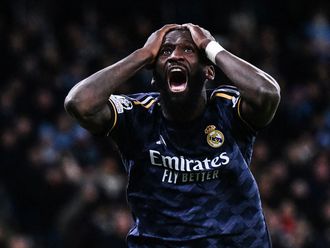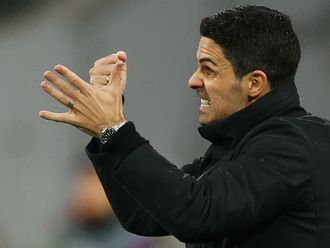Ankara: Turkish President Recep Tayyip Erdogan on Monday held talks in Ankara with his Russian counterpart Vladimir Putin aimed at boosting trade and strengthening relations, despite sharp differences over the crises in Syria and Ukraine.
Erdogan personally welcomed Putin for the one-day state visit at the gates of his controversial new presidential palace in Ankara and the Russian leader is only the second world dignitary to visit the grandiose complex after Pope Francis on Friday.
Talks were expected to focus on energy cooperation — with Ankara seeking not only a reduction in gas prices from Russia, but also greater import volumes ahead of the winter — as well key diplomatic issues.
Putin, heading a delegation of ten Russian ministers, was also expected to discuss how to realise the aim of tripling bilateral trade to a target of $100 billion (Dh367 billion) in the next years from $32.7 billion in 2013, a goal some analysts see as wildly over-ambitious.
His visit came just over a week after talks between US Vice-President Joe Biden and key Nato ally Turkey failed to reach a breakthrough on cooperating over Syria.
The meeting is the first time the pair have met face-to-face since Erdogan moved from the post of prime minister to president in August, the same job change that Putin himself made in 2012.
Putin, whose motorcade was accompanied along closed-off streets by soldiers on horseback, was welcomed with full state honours at the palace which has just become operational after being built at a cost of $615 million.
Charismatic strongmen
Commentators often note the similarities between Erdogan, 60, and Putin, 62, both charismatic strongmen accused abroad of authoritarianism, while retaining significant support at home.
Russia and Turkey appear so far to have successfully shielded their close relations from potentially damaging disputes over the crises in Syria and Ukraine.
Ankara — a strong supporter of the territorial integrity of states due to its own battle with Kurdish separatists — opposed Russia’s annexation of Crimea from Ukraine this year.
It is also worried about the situation on the Black Sea peninsula of the Turkic Crimean Tatar minority who, according to activists, are the victims of persecution by the new pro-Kremlin authorities.
Meanwhile, the two countries are at odds over the Syria conflict, with Putin the last remaining major ally of President Bashar Al Assad, while Erdogan is pressing for the Syrian leader to be ousted without delay.
But these disputes do not appear to have harmed other aspects of cooperation, with more than four million Russian tourists visiting Turkey annually and Russia building Turkey’s first nuclear power plant in a $20 billion project.
In a decision clearly timed to coincide with Putin’s visit, Turkey’s environment ministry on Monday approved the building of the Akkuyu nuclear power plant after an environmental impact report.
Russia, isolated by the West over its role in the Ukraine conflict, is also looking for close cooperation with Ankara as it takes over the G20 presidency in 2015.
Even on Syria, Ankara and Moscow may now find common ground on the need to fight against Daesh militants who have taken swathes of the country up to the Turkish border.
Daesh is “recruiting Muslims from the [Russian] Caucasus as well. This constitutes a serious security problem for Russia,” a Turkish official said.
Turkey — the second largest European importer of Russian gas after Germany — wants cheaper but more gas from Russia especially in the current winter season.
Energy Minister Taner Yildiz noted on a visit to Moscow last week that in some Turkish regions 22 times more gas is needed in winter than in summer.
Gazprom had promised to increase deliveries this year to Turkey to 30 billion cubic metres of gas, up from 26.7 billion last year.
However to the alarm of Ankara, the projected figure has now fallen due to the crisis in Ukraine, a key transit country and on Saturday Gazprom chief executive Alexei Miller held unannounced talks in Istanbul with Erdogan.










